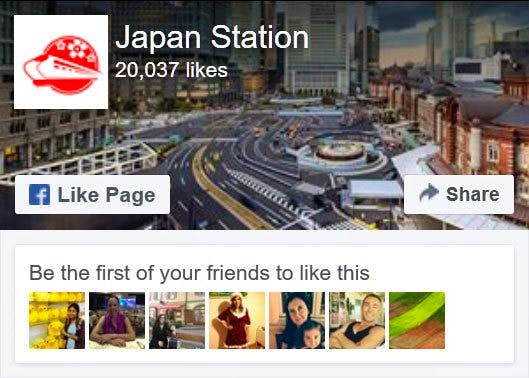Kappabashi Dougu-gai is a shopping street on the west side of Asakusa which is lined on both sides with specialty wholesale shops selling kitchenware and restaurant supplies.
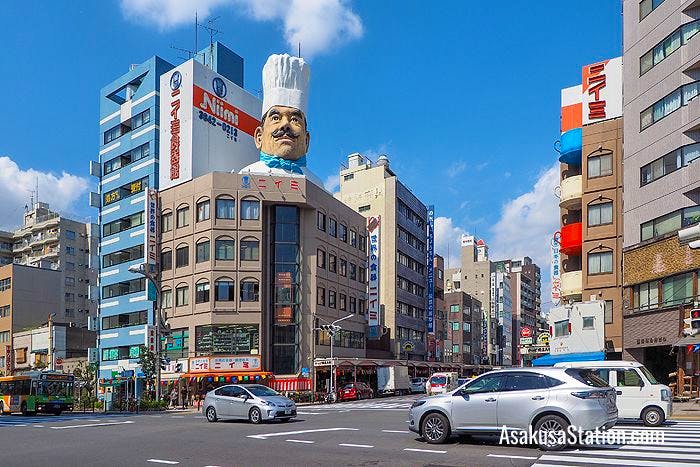
Kappabashi Dougu-gai – Tokyo’s Kitchenware Street
The street runs for around 800 meters and has 170 shops selling every imaginable kind of cookware, tableware, kitchen utensils, restaurant uniforms, and plastic food models. For this reason it is known as the number one location for kitchen supplies in Japan. Professional cooks, chefs, and restaurateurs from across Japan, and from overseas too, visit Kappabashi Street in search of specialized cooking utensils, but casual shoppers also shop here for the best kitchen equipment and for bargain buys. Recently the street has also become an alternative tourist site, and it is certainly a good spot to find unique souvenirs.
Kappabashi’s Watery Origins
Kappabashi Dougu-gai dates back to 1912 when a number of stores opened here selling old tools, utensils, and furniture. After World War II it developed into the kitchenware specialty district we know today. There are various stories about how the Kappabashi district got its name. Along the street you will see a variety of images of the “kappa” monster, a mythical green creature that lives in rivers and ponds. This kappa monster has become a popular mascot for the street. However, the name “Kappabashi” actually means “Raincoat Bridge”.
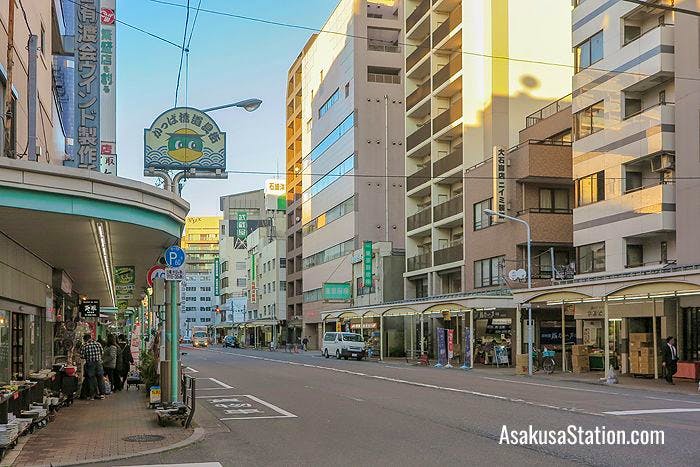
A kappa road sign on Kappabashi Dougu-gai
One explanation of the name is that people used to sell raincoats on a nearby bridge. However, it seems more likely that the street got its name from a 19th century merchant called Kihachi Kappaya who sold raincoats in this area. At that time, Asakusa often suffered from terrible floods because it was close to the Sumida River. Kihachi invested his own money in bridge and drainage canal construction to reduce the problem of flooding. Some stories tell how Kihachi was helped in this construction work by the legendary kappa creatures. However, the area was probably named after Kihachi’s raincoat business in gratitude for his public spirit. Kihachi died in 1814 and was buried nearby at Kappa-dera (“Raincoat Temple”).
Shopping on Kappabashi Dougu-gai
Kappabashi Dougu-gai is a great place to find inexpensive ceramics, chopsticks, and lacquerware, top-quality kitchen knives, and sturdy pots and pans. However, some of the other restaurant supplies also make for interesting souvenirs. Watch out for bamboo craft utensils, paper lanterns, noren split curtains, maneki neko beckoning cats, and super realistic plastic food samples. Conveniently, both sides of the road have a covered walkway so you don’t need to worry about shopping in the rain. Here are some highlights from the variety of goods on offer.
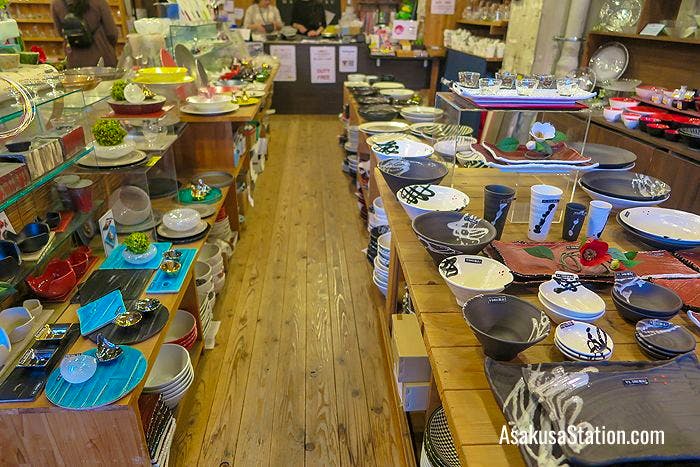
Ceramics and glassware
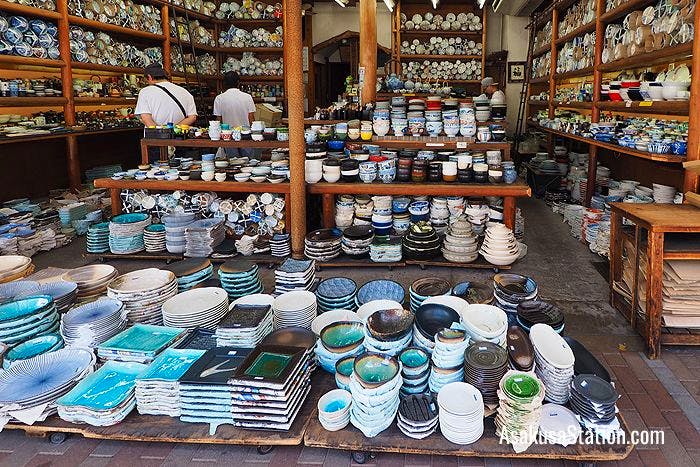
More floor to ceiling Japanese ceramics in Kappabashi
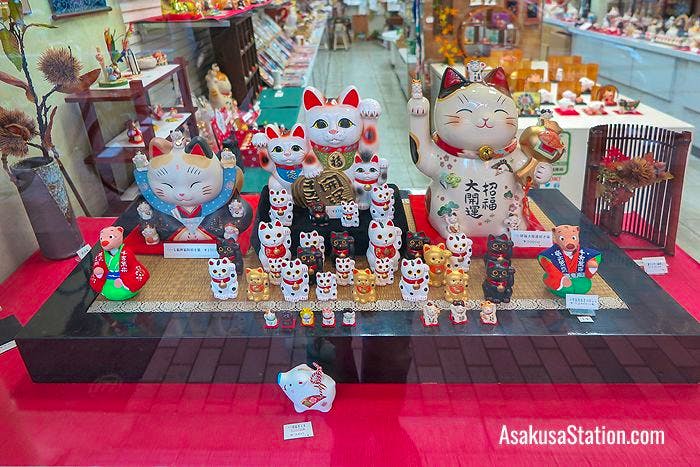
A selection of maneki neko (beckoning cats)
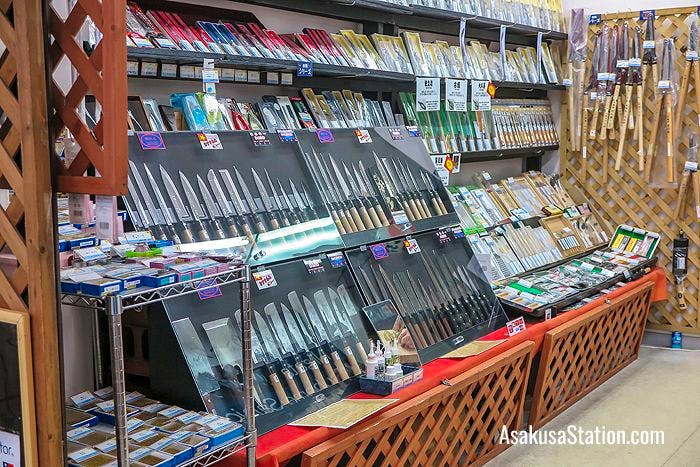
The very best kitchen knives
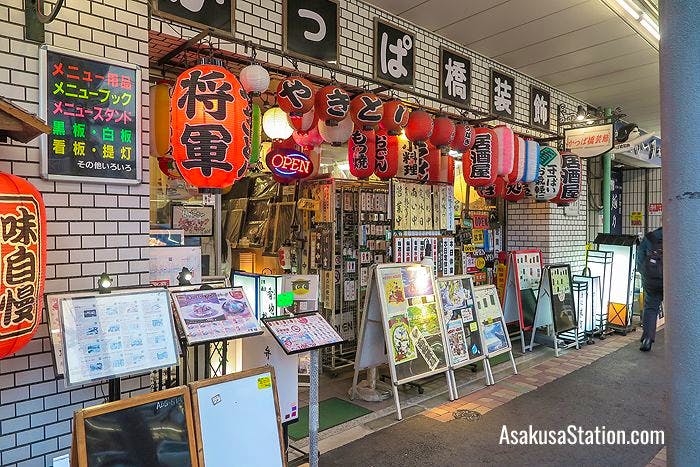
A lantern and signage shop
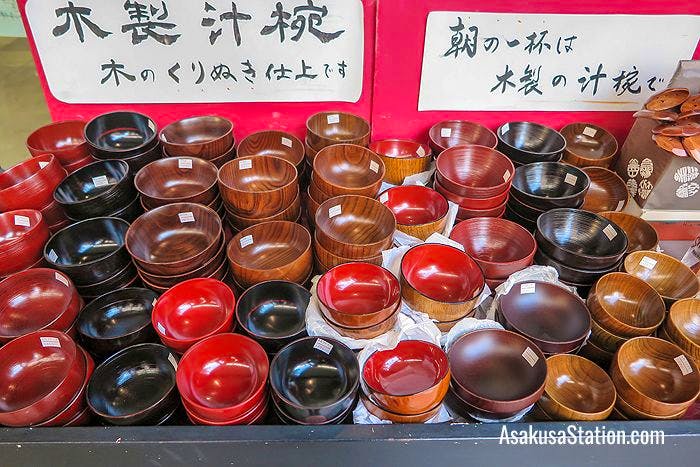
Wooden and lacquer soup bowls
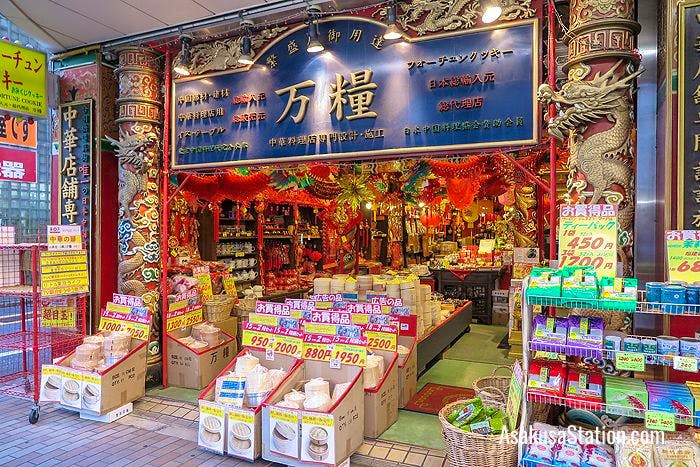
The Manryo store specializes in colorful decorations for Chinese restaurants
Interested in Chinese culture and cuisine? The Manryou store is for you. This store specializes in ornaments and furnishings for Chinese restaurants, but also sells fortune cookies, Chinese tea and tea sets, specialized utensils for Chinese cooking, and a variety of goods related to Feng Shui. Here is a map of its location.
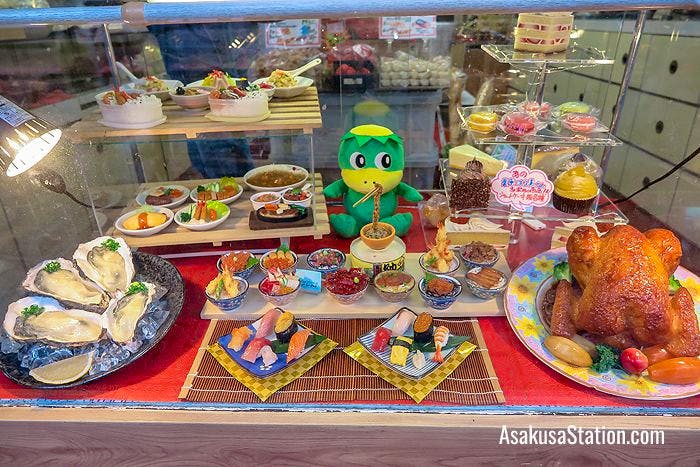
Plastic food samples
Plastic food samples are usually made for display in restaurant shop windows. However, some sample makers have taken their work to such a realistic level that they have become popular souvenirs for shoppers on Kappabashi. Ganso Shokuhin Sample-ya has some beautiful examples on display and also offers regular sample making experiences. These experiences are only offered in Japanese though, so you will need to bring a friend along to interpret. Here is a map with the store’s location.
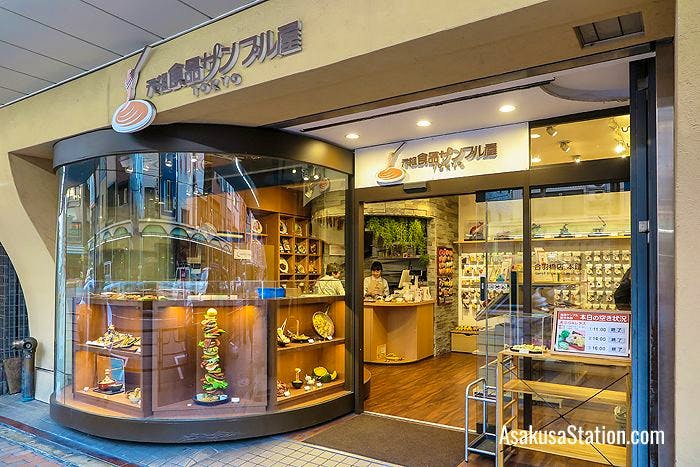
Ganso Shokuhin Sample-ya
Union Coffee is a well-known merchant of all things related to coffee, especially pour-over coffee wares and supplies. Here you will find pour-over kettles, Japanese siphon coffee makers, Chemex pots, grinders, and a wide selection of filters. Union coffee also sells green and roasted specialty coffee beans. A visit to Union Coffee is a must for any coffee connoisseur or a professional barista. Here is a map with the store’s location.
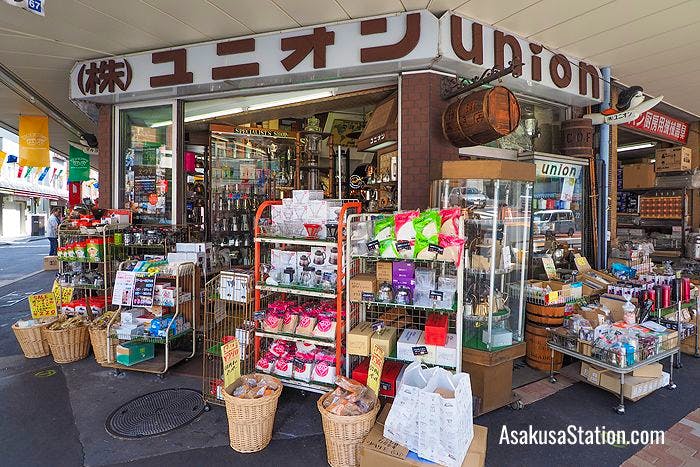
Union Coffee shop in Kappabashi
Opening times on Kappabashi Dougu-gai vary with each shop, but most shops are open between 9.00 and 17.00, and some are open till 19.00. Shops also take different holidays, so there are always some shops open on the street.
Smart Refund – Tax-Refund Counter
A lot of stores on Kappabashi Dougu-gai offer a tax refund for overseas travelers. For stores that are members of the Smart Refund system you can get tax back on all your purchases at the Smart Refund Tax-Refund Counter. Just bring your receipts, and passport, and the credit card you used to make your purchase.
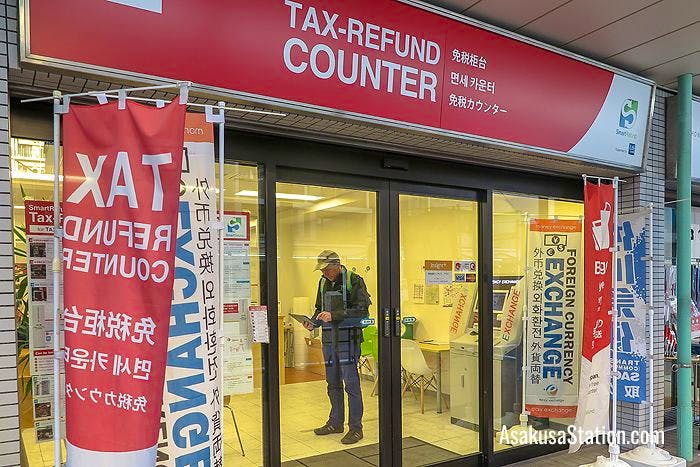
Smart Refund – Tax-Refund Counter
The Tax-Refund Counter also has a number of other useful services such as foreign currency exchange, baggage storage, and shipping. Baggage storage costs 800 yen for one item per day. Alternatively you can have items sent to your hotel, the airport or overseas. For more details visit the Smart Refund website
Kappabashi Hondori
Kappabashi Hondori is another street that runs east to west and meets Kappabashi Dougu-gai at the Kappabashi intersection. On the south-west corner of this intersection is a tiny “pocket park” with a golden stature called “Kappa Kawataro”. The statue was erected to commemorate the 90th anniversary of Kappabashi Dougu-gai and is a popular local landmark
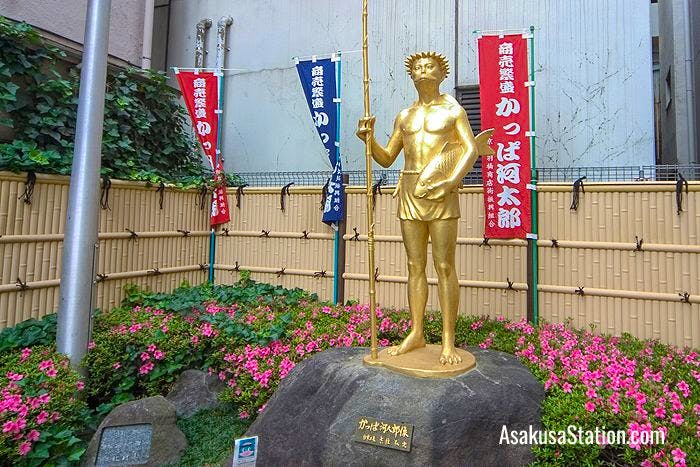
Kappa Kawataro golden statue
If you take Kappabashi Hondori back into Asakusa, you will have the perfect view of Tokyo Skytree ahead of you all the way. Also, this street has a lot of restaurants, which could be useful if looking at lots of plastic food samples has made you hungry.
Kappabashi Location Map
Kappabashi Dougu-gai is located on the west side of Asakusa. It runs from the Kikuyabashi intersection on Asakusa Dori as far north as Kototoi Dori. It is about 5 minutes’ walk from TX Asakusa Station on the Tsukuba Express Line, 5 minutes from Tawaramachi Station on the Tokyo Metro Ginza Line, and 14 minutes from the Tobu, and Toei Asakusa stations.
Article by Michael Lambe. Photos by shingo/pixta (14), and Michael Lambe. All rights reserved.
